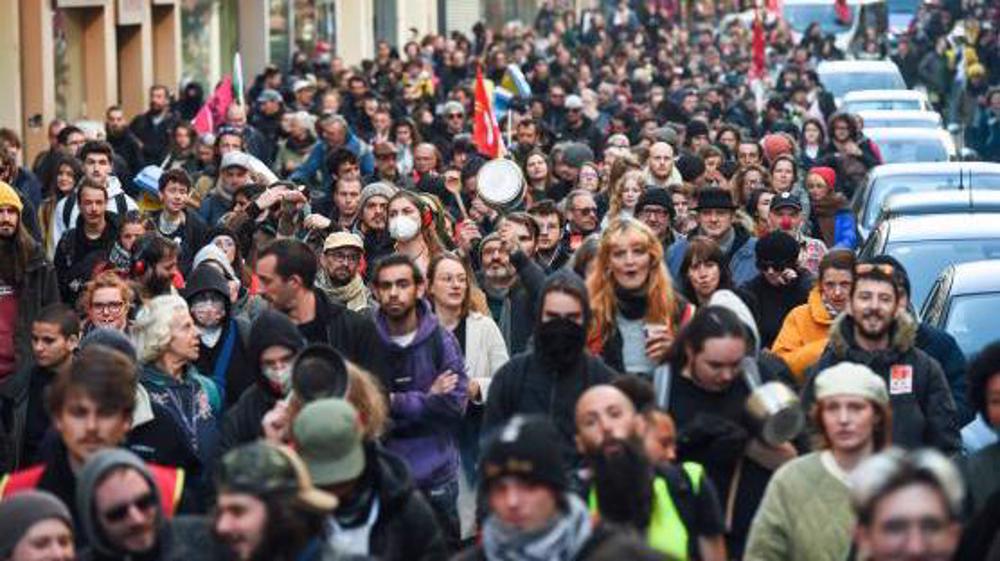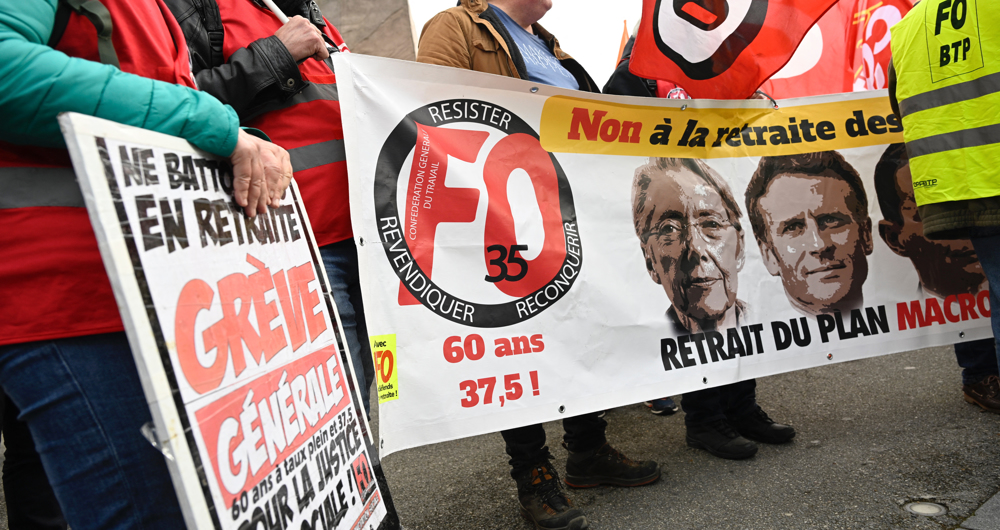French people continue protests, laying bare EU’s democracy crisis
By Ramin Mazaheri
For over two centuries, France was seen as the only Western country that mattered. It might sound like a sweeping statement, but the political history of the kings of Sweden, the Netherlands and England, and the bourgeois democracies of the United States, Italy and Switzerland shows they just did not cut it.
While speaking to people who have been protesting in France for months, they say it is not arrogance. You can’t blame them for knowing the historical record. They say they are fighting now not just to save their own crisis-hit country but they are fighting for all of Europe, and also for the whole world.
That’s why their current fight to get the already-enacted two-year hike to the pension age pulled back is so important: This is a major new test for our new era on the question of national sovereignty, which is a concept that was deemed irrelevant in the now-dead unipolar world.
The French people are now relying on tactics that worked pre-European Union, but will they work now? Can countries go their own way within the bloc?
France’s trade unions think so, but I would say they are making a promise they can’t keep, or they are living in the past, or they are on the cusp of revealing themselves to be actually powerless now.
They have decided to hark back to 2006 when protests successfully forced the government to revoke an unpopular law that had been passed into legislation.
Indeed, this is a last, desperate gambit to repeal the age hike, but the tactic has worked before.
In 2006, the offending law was one which made firing youth workers easier, and the pension hike affects even more citizens and thus can draw in even more participants.
Unions, NGOs and social activists are saying they can apply enough pressure on President Emmanuel Macron to revoke the law, just like they forced a revocation from then-President Jacques Chirac.
Color me skeptical
It’s far more than 17 years that separate the two social struggles - the entire weight of the EU now exists, and they have “won” everywhere ever since the Lisbon treaty came into full force in 2009.
Just look at the democratic failures of Greece and Spain (Syriza and Podemos, respectively) - they took a very mild, respectful, play-by-the-rules approach and were totally disregarded.
Revolutionaries do not play by the rules of the status quo but impose new ones.
What so many in Europe fail to grasp is that their old, national laws have been superseded by European Union laws in so many vital areas - the EU was truly a Liberal Democratic revolution for Europe.
Of course, it was a reactionary one: Liberal Democracy is less advanced than Social Democracy (which reigned post-WWII in Europe), which in turn is less advanced than Socialist-inspired Democracy, and this is simply the historical record post-1848.
In France, we saw the Yellow Vest movement start in late 2018, and we saw how it was repressed with unprecedented savagery. That was anti-citizen violence unseen in the West since World War II, but it still failed to get more public opinion into policy-making, i.e. the true test of any democracy’s bonafide.
With unions forced to catch up with the Yellow Vests, they led the 2019-20 general strike - the longest labor movement in French history. That was also ignored by Macron and Brussels.
It would appear that to get the government to willfully revoke the age hike a social movement of an equal or greater amplitude than those two events is required. However, in response to the immediate protests after the age hike went into law last week, Macron imperiously scoffed: “I saw much worse with the Yellow Vests.”
Of course, he did. Nothing in Western political history for 75 years compares with the civic-minded self-sacrifice of that group. However, one wishes Macron had the guts to say that in front of the over 30 Yellow Vests who lost an eye while exercising the right to the free assembly under his quite-violent reign.
But can France’s grassroots groups come up with something which isn’t even “much worse” but just close to the Yellow Vests' ability to shine a light on the lack of democracy in France and the EU?
I don’t think so, but we aren’t going to really find out until after May 1, which is International Workers’ Day.
May 1 is a free pass - not for French protesters but for Macron
In the fight to get the age hike revoked, unions have promised a huge show of force on May 1, but major marches are pretty standard for France on May 1.
Anyway, I doubt it will be as bad as in 2019 - that wasn’t a march but a shooting gallery for the joy of the detested French riot police.
It was brutally repressed because it was the government’s coup de grâce to intimidate the average person from protesting, and (in conjunction with a litany of “anti-Yellow Vest laws” and judicial repression) it worked - people became too scared to join the Yellow Vests anymore.
Even if they top that, a big May Day - no matter how anti-democratically repressed - isn’t going to get Macron, the 1%, or Brussels to back down, history has shown.
So throw May 1 out of the window - it’s what comes after that will count in this fight. Right now, the new thing is to hark back not to 2006 but to 1830: banging saucepans in front of city halls at 8 pm, or whenever Macron or his ministers make a public appearance.
These “casserole” protests may be the start of something big, but they have a long way to go to reach the impact of the Yellow Vests or even the recent general strike.
The year 1830 is worth mentioning to show how consistently the French have been ahead of the curve politically in the West:
Known as the “July Revolution”, it saw the Bourbon family - ousted in 1789 yet restored to power in 1815, but only after England led seven different Europe-wide coalitions for almost 25 continuous years to destroy the popular anti-monarchy French Revolution - pulled off the throne once again.
However, calling it the “Second French Revolution”, as some do, is incorrect because an overturning of society’s pyramid did not occur this time - another monarch merely took the old one’s place.
The new one consented to be called the king of “the French” instead of the king “of France”, and this is why 1830 isn’t as well known as 1789, 1848, or the Paris Commune of 1871.
However, this new awareness of the deserved primacy of the average citizen - so taken for granted to be true now but so politically radical back then, and a concession that was totally unobtainable everywhere else in autocracy-dominated Europe in 1830 - was a direct result of how the French Revolution empowered the European 99% for the first time ever.
It wouldn’t be until 1918, and the horrors of World War I, that the awful monarchies of Europe would have to accept the values first won in France in 1789.
This not-so-distant history of 1830 greatly influences the Liberal Democracy of today’s European Union: we see the same sleight-of-hand which tries to pass autocracy off as progressive politics.
It’s worth remembering that Macron’s book which declared his 2017 election project was titled Revolution - yet more faux-progressive sleight of hand which hides anti-democratic repression and shameless hypocrisy.
If the French cannot influence their government on how a law is written, if protests can’t stop it from being rammed past the legislative branch by executive decree, and if protests can’t get the massively-unpopular law revoked, then French democracy is truly just a once-every-seven-years event.
They don’t elect a president, but a Presidential Dictator. Or perhaps more accurately, an “EU governor”, and one “of France” but not “of the French”.
There was a totally misplaced and desperate hope in France that the nation’s totally pro-status quo Constitutional Council would judicially strike down the obviously unconstitutional way the age hike was forced past legislative branch approval.
When the Council - in no surprise to those who realize the dependably reactionary nature of Liberal Democratic judicial branches - validated the law on April 14, yet another pillar joined the heap of discredited French democratic ash.
If unions fail after May 1, the flag of 2006 will also join that bin, and thus the fig leaf of democracy in France and the EU will shrink even more.
The EU, despite its belief that the non-Western world can’t comprehend what’s going on, will eventually run out of sleight-of-hand tricks. They only fool themselves, they should learn.
There will be blood this May Day in France, yet again, and the West’s so-called human rights watchdogs won’t see a thing – which is a certainty.
The social movement which will come afterward in the fight to repeal the 2-year age hike seems very unlikely to reach the level needed to force the hand of Europe’s leaders, but - then again - the public will never force the hand of Europe’s leaders.
For over two centuries: if it does, then it must be France - and it would mean another French attempt at progressive revolution.
Ramin Mazaheri is the chief correspondent in Paris for Press TV and has lived in France since 2009. He has been a daily newspaper reporter in the US, and has reported from Iran, Cuba, Egypt, Tunisia, South Korea and elsewhere.
(The views expressed in this article do not necessarily reflect those of Press TV.)
'Blatant war crime': Iran denounces US-Israel strikes on Gandhi hospital in Tehran
IRGC spox: 650 casualties for US military in two days as Iran missiles force aircraft carrier to fle
Tehran warns of false-flag operations, says Israel ‘undoubtedly’ seeking to widen war
New wave of attacks devastates key US base in Bahrain as Iran strikes back
Melania Trump chairs UN children's meeting as Iran buries kids killed in US-Israeli attack
Why Iran’s Leader refused special protection, leading from the front until last breath
Hezbollah strikes Israeli surveillance, military base in Golan Heights, occupied lands
Iran holds funeral for scores of schoolgirls murdered in US-Israeli aggression















 This makes it easy to access the Press TV website
This makes it easy to access the Press TV website